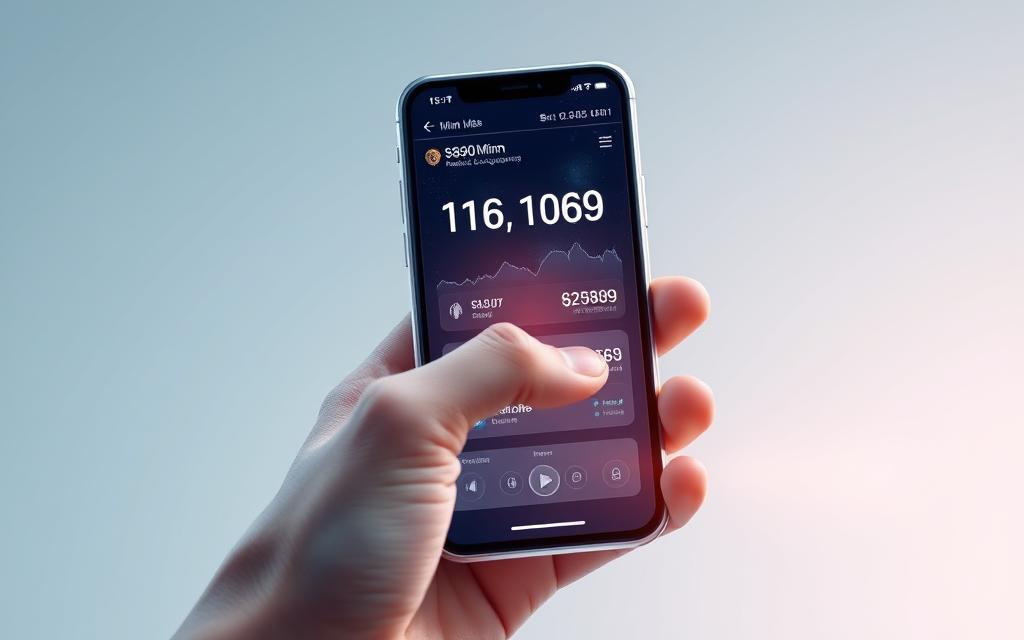Table of Contents
Mobile mining has gained traction as users explore ways to earn digital assets without expensive hardware. While phones lack the power of dedicated rigs, some apps allow passive rewards. However, expectations must stay realistic.
The Pi Network remains a top choice, though its coin value dropped from $1.97 to $0.66. Earnings average $5 monthly—enough for coffee, not retirement. Other options exist, but rewards rarely exceed $6 per app.
Overheating risks and accelerated battery wear make this a side hustle, not a primary income source. Unlike GPU or ASIC setups, phone-based mining focuses on accessibility over profits.
This guide covers viable 2023 options, separating hype from reality. Learn which networks still support mobile users and how to maximize earnings safely.
Introduction to Mobile Cryptocurrency Mining
Smartphones now play a surprising role in blockchain networks through lightweight mining apps. Unlike traditional rigs, these apps reward users for participation rather than solving complex algorithms. This approach democratizes access to digital assets.
How it works: Most mobile apps distribute tokens for simple tasks like watching ads or logging in daily. For example, StormGain uses cloud-based solutions to simulate mining without draining your device.
“Mobile mining fosters decentralization by engaging everyday users in token distribution.”
Traditional crypto mining relies on heavy hardware, but phones operate differently. Here’s a quick comparison:
| Factor | Phone Mining | ASIC Mining |
|---|---|---|
| Power Usage | ~2% battery/hour | 3,000+ watts |
| Profitability | $5–$6/month | Varies by coin |
| Hardware Cost | Free (existing phone) | $1,000+ |
Phones contribute to blockchain security by verifying transactions across decentralized networks. While earnings are modest, the process supports broader adoption.
Key takeaway: Mobile mining prioritizes accessibility over profits, making it ideal for casual users. Always research apps to avoid scams.
What Cryptocurrency Can I Mine with My Phone? Top Options in 2023
Earning digital assets through smartphones has become a viable option for casual users. While profits won’t replace a full-time income, these five platforms offer accessible entry points into blockchain networks.

Pi Network (Pi)
With over 35 million users, Pi Network remains a leader in mobile mining. Its Stellar Consensus Protocol rewards daily app check-ins rather than intensive computations.
- Profitability: 180% YTD, averaging $5 monthly
- Token Value: $0.66 (down from $1.97 peak)
- Unique Feature: No ads or battery drain
Electroneum (ETN)
This KYC-compliant platform combines cloud gaming with mining rewards. Its 4.2 million users earn ETN tokens through tasks and referrals.
- Monthly Revenue: $5.50
- Performance: 190% profitability despite 4.2% YTD dip
- Bonus: Free cloud gaming credits
Phoneum (PHT)
An eco-friendly alternative, Phoneum uses trivia games to distribute tokens. Over 500,000 Play Store downloads highlight its popularity.
- Earnings: $5.20/month
- YTD Change: -2.8% (stable compared to peers)
- Perk: Zero energy-intensive processes
“Platforms like Phoneum prove that mining can be both fun and sustainable.”
StormGain
Focused on Bitcoin, StormGain offers cloud-based mining with a 10% annual yield. Ideal for users preferring passive BTC accumulation.
- Minimum Withdrawal: $300
- Profitability: 210% (highest on this list)
- Caveat: Requires initial crypto investment
TimeStope
This geolocation app rewards users for exploring local businesses. Though unlisted on major exchanges, its 175% profitability attracts niche miners.
- Monthly Estimate: $4.80
- Drawback: Limited liquidity
For a deeper dive into best cryptocurrencies to mine, compare hardware requirements and long-term potential.
How Phone Mining Works: Apps and Mechanisms
Many assume phone-based mining involves solving complex algorithms, but most apps use simpler reward systems. Unlike traditional rigs, mobile platforms prioritize accessibility over computational power.
https://www.youtube.com/watch?v=55khEABmTIk
Understanding “Mining” in Mobile Apps
Legitimate mining apps like Brave Browser reward users with BAT tokens for viewing ads. Others, such as NiceHash, act as hashrate marketplaces without draining device resources.
Pi Network exemplifies social verification—earning tokens requires daily check-ins, not energy-intensive calculations. This approach supports network security while conserving battery life.
“True mobile mining apps enhance decentralization by engaging everyday users in lightweight consensus mechanisms.”
Legitimate Mining Apps vs. Gimmicks
Be wary of apps promising Bitcoin rewards via phone processing. These often overheat devices and slash battery lifespan by 40% with 24/7 operation.
- Trusted Platforms:
- Minerstat for remote rig monitoring
- Binance Cloud Mining ($30.50/month ROI for Ethereum Classic)
- Red Flags:
- Unrealistic profit claims
- No clear token distribution model
For deeper insights into crypto mining apps, compare features and user reviews. Those interested in CPU mining alternatives should assess hardware compatibility.
Pros and Cons of Mining Cryptocurrency with Your Phone
Exploring crypto rewards through mobile devices offers convenience but comes with trade-offs. While phones eliminate upfront hardware costs, long-term risks like battery wear and low earnings require careful consideration.

Advantages of Mobile Mining
No expensive hardware is needed—your existing phone suffices. This makes crypto mining accessible to beginners without $1,000+ ASIC rigs.
Phones consume just 0.5W of power, making them eco-friendly compared to energy-hungry traditional setups. Apps like Pi Network reward users for minimal daily engagement.
Earnings, though modest, require zero technical expertise. Most platforms distribute tokens for simple tasks like watching ads or logging in.
Disadvantages and Risks
Mining 8 hours daily reduces phone resale value by 50% in six months. Batteries degrade 30% faster than normal use, per recent studies.
Profitability averages $5–$6 monthly—enough for coffee, not rent. Over 80% of mining apps violate Google Play policies, risking account bans.
“The IRS treats mined coins as taxable income. Even $5/month adds to your annual reportable earnings.”
Regulatory risks include delistings—privacy coins like Monero face exchange restrictions. Always verify an app’s legality in your region.
Key takeaway: Mobile mining works best as a side hustle. Balance low entry costs against potential device damage and tax obligations.
Tips for Maximizing Your Phone Mining Experience
Maximizing rewards from mobile mining requires smart strategies and app selection. While earnings are modest, these tactics help users balance profitability with device health.

Choosing the Right App
Stick to mining apps with over 1 million downloads and 4-star ratings, like Pi Network or StormGain. These platforms have proven track records and lower scam risks.
NiceHash offers BTC rewards for rented hashrate, ideal for users preferring passive income. Always check withdrawal thresholds—some platforms require $300+ to cash out.
Optimizing Device Performance
Limit sessions to 2-hour intervals to prevent overheating. Enable battery saver mode to reduce CPU strain by 20%, extending your device lifespan.
Tools like Minerstat track efficiency, helping users adjust settings for better performance. Avoid charging while mining—it accelerates battery degradation.
Managing Expectations
Join Telegram communities (e.g., Electroneum’s 100K-member group) for app-specific tips. Reinvest earnings into cloud mining, like Binance’s 10% APY, for compound growth.
“Sustainable mining hinges on treating it as a side activity, not a primary income stream.”
*Key takeaway*: Focus on reputable platforms, protect your device, and reinvest wisely to amplify rewards over time.
Conclusion
The landscape of mobile mining continues evolving with new technologies. Platforms like Pi Network, Electroneum, and StormGain offer the best risk-reward ratios for users seeking entry-level crypto engagement.
Treat phone-based mining as a learning tool rather than income source. With Bitcoin’s difficulty rising 200% since 2021, phones now serve better as gateways than profit drivers.
By 2025, AI-driven apps may boost efficiency, making mobile mining more viable. Pair these efforts with staking or cloud solutions to diversify your crypto portfolio.
Final note: Stay updated on trends—this space shifts fast. What’s experimental today could reshape the world of decentralized rewards tomorrow.
FAQ
Is mobile mining profitable in 2023?
While some apps like Pi Network or Electroneum offer rewards, earnings are typically small. Most mobile mining focuses on accumulating tokens rather than immediate profits.
Does phone mining damage my device?
Excessive processing can strain hardware. Use apps with low CPU/GPU usage and avoid overheating by limiting session times.
Are there cloud mining alternatives for smartphones?
Yes, platforms like StormGain provide cloud-based options where users earn crypto through trading rather than direct mining.
How do I avoid scams in mobile mining apps?
Stick to verified apps with strong communities, like Pi Network or Phoneum. Avoid apps demanding upfront payments.
Can I mine Bitcoin with a phone?
No—Bitcoin mining requires specialized ASIC rigs. Mobile apps simulate mining or offer alternative reward systems.
What’s the best smartphone for mining?
Devices with efficient processors (e.g., Snapdragon or Apple Bionic chips) and good cooling perform better. Prioritize battery life and thermal management.
Do mining pools work on phones?
Some apps, like Electroneum, integrate pooled mining, but rewards are shared and often minimal compared to traditional pools.
How much electricity does phone mining use?
Most apps minimize power consumption, but prolonged use can drain batteries. Monitor usage via your device’s settings.









